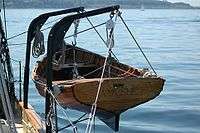davit
See also: დავით
English
Etymology
The word davit is derived from Middle English and OldFrench daviot, which is a diminutive of David, thus it means: little David; maybe because those small cranes can handle a much bigger lifeboat. [1]
Pronunciation
- IPA(key): /ˈdeɪvɪt/, /ˈdævət/
- Rhymes: -eɪvɪt
Noun
davit (plural davits)
- (nautical) A spar formerly used on board of ships, as a crane to hoist the flukes of the anchor to the top of the bow, without injuring the sides of the ship.
- (nautical, construction) A crane, often working in pairs and usually made of steel, used to lower things over an edge of a long drop off, such as lowering a maintenance trapeze down a building or launching a lifeboat over the side of a ship.
- 1912, Morgan Robertson, The Wreck of the Titan: Or, Futility
- A solid, pyramid-like hummock of ice, left to starboard as the steamer ascended, and which projected close alongside the upper, or boat-deck, as she fell over, had caught, in succession, every pair of davits to starboard, bending and wrenching them, smashing boats, and snapping tackles and gripes, until, as the ship cleared herself, it capped the pile of wreckage strewing the ice in front of, and around it, with the end and broken stanchions of the bridge.
- 1912, Morgan Robertson, The Wreck of the Titan: Or, Futility
Synonyms
- (spar used to hoist the flukes of the anchor): fish davit
Translations
crane to sling a lifeboat, maintenance trapeze etc
References
- Webster's New World Dictionary of the American Language, New York 1968
This article is issued from
Wiktionary.
The text is licensed under Creative
Commons - Attribution - Sharealike.
Additional terms may apply for the media files.
